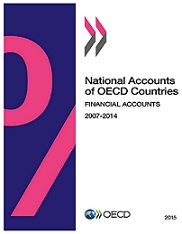OECD, (2016), “National Accounts of OECD Countries, Financial Accounts 2015”, OECD Publishing, 2 Σεπτεμβρίου The National Accounts of OECD Countries, Financial Accounts includes financial transactions (both net acquisition of financial assets and net incurrence of liabilities), by institutional sector (non-financial corporations, financial corporations, general government, households and non-profit institutions serving households, total economy and rest of the world) and by financial operation. Country tables are expressed in national currency. Data …Read More
The Impact of Brexit on the EU Budget: A non-catastrophic event
Núñez Ferrer, Jorge, Rinaldi, David, (2016), “The Impact of Brexit on the EU Budget: A non-catastrophic event”, CEPS, 7 Σεπτεμβρίου Given that the UK is one of the largest economies in the Europe Union – with per capita income above the EU average and therefore a net contributor – there have been concerns that the country’s decision to leave the EU could strongly impact the EU budget. On closer scrutiny, however, this …Read More
Increases in the retirement age and labour demand for youth
Boeri, Tito, Garibaldi, Pietro, Moen, Espen (2016), “Increases in the retirement age and labour demand for youth”, VoxEU, 8 Σεπτεμβρίου The Eurozone’s sustained rise in youth unemployment since 2008 threatens to create a ‘lost generation’. This column presents evidence that this is, in part, an unintended consequence of pension reforms in southern Europe that locked in older workers. In future, reforms that create flexible retirement ages alongside variable pension levels …Read More
European banks under stress (tests): Which remain the most resilient?
De Groen, Willem Pieter, Gros, Daniel, (2016), “European banks under stress (tests): Which remain the most resilient?”, CEPS, 11 Αυγούστου The latest round of stress test conducted by the European Banking Authority for 51 large banking groups showed huge differences in the degree to which a shock, or so-called adverse scenario, would impact different banks. We find that banks with a high exposure to sovereign risk and especially those with many non-performing loans …Read More
Key Findings from the ECRI Statistical Package 2016
Musmeci, Roberto, (2016), “Key Findings from the ECRI Statistical Package 2016”, CEPS, 18 Αυγούστου The ECRI Statistical Package 2016, Lending to Households and Non-Financial Corporations, offers an extensive and detailed overview of the credit market in the EU, providing data on the total lending extended by monetary financial institutions (MFIs) to domestic households and non-financial corporations (NFIs) in EU countries over the 1995-2015 period. The 2016 edition also provides data on …Read More
The long and winding road to fiscal adjustment: How the IMF judges austerity programmes
Hinterleitner, Markus, Sager, Fritz, Thomann, Eva, (2016), “The long and winding road to fiscal adjustment: How the IMF judges austerity programmes”, LSE Europpblog, 6 Σεπτεμβρίου IMF judgements on whether government austerity programmes can be successfully implemented are carefully followed by international financial markets. Markus Hinterleitner, Fritz Sager and Eva Thomann analyse the way the organisation has judged the credibility of austerity programmes in 14 European countries. They find that the IMF …Read More
OECD Sovereign Borrowing Outlook 2016
OECD (2016), “OECD Sovereign Borrowing Outlook 2016”, OECD Publishing, 6 Σεπτεμβρίου The OECD Sovereign Borrowing Outlook provides regular updates on trends and developments associated with sovereign borrowing requirements, funding strategies, market infrastructure and debt levels from the perspective of public debt managers. The Outlook makes a policy distinction between funding strategy and borrowing requirements. The central government marketable gross borrowing needs, or requirements, are calculated on the basis of budget …Read More
Is there such a thing as “Social Europe”?
Fernandes, Sofia, Rinaldi, David, (2016), “Is there such a thing as “Social Europe”?”, Notre Europe – Jacques Delors Institute, 6 Σεπτεμβρίου Although the EU developed a “Social Europe”, the economic crisis and public debt has caused an imbalance between the social and economic dimensions of the European project. In this tribune, the authors start with a brief discussion on the construction of the social acquis in order to answer the following questions: Why must Social Europe …Read More
Europe’s incompatible political trinities
Buti, Marco, Lacoue-Labarthe, Muriel, (2016), “Europe’s incompatible political trinities”, VoxEU, 7 Σεπτεμβρίου The Eurozone Crisis has taken a significant toll – both economic and political – on EU member states as well as the Union as a whole. This column identifies three elements that are key to a working solution for continued union: overcoming the intergovernmental method that has dominated EU decision‑making since the crisis, avoiding the seemingly easy route of …Read More
A Feasible Unemployment-Based Shock Absorber for the Euro Area
Brandolini, Andrea, Carta, Francesca, D’Amuri, Francesco, (2016), “A Feasible Unemployment-Based Shock Absorber for the Euro Area”, Journal of Common Market Studies, 11 Ιουλίου Based on theoretical insights, this article identifies the broad characteristics that a shock absorber based on unemployment should have in order to be incentive-compatible and politically feasible. It then empirically derives the combination of activation thresholds, experience rating, eligibility criteria and benefit generosity which define the systems offering the highest stabilization for …Read More





